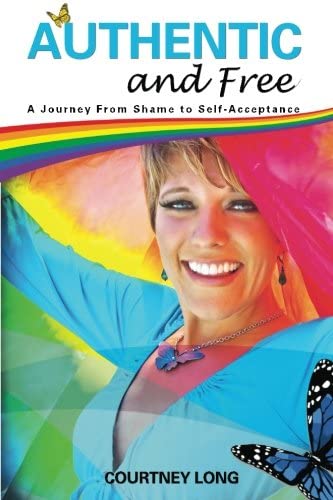Review by Jennifer Taub
As described on her website, Courtney Long is an Inspirational Speaker, Wellness Coach, Social Worker, Transformational Life Coach, Certified Hypnotherapist, Spiritual Coach and Reiki Master. Her self-published Authentic and Free: A journey from shame to self-acceptance alternates between memoir, journal entries, and passages of conversations between Courtney and a friend likely responsible for the “creative” part of the “creative non-fiction” category listed on the cover.
A white, middle class, self-described good girl from a nice home, Courtney details her thoughts and feelings from various time points in her life when she faced struggles with compulsive exercise, restrictive eating, attractions to both boys and girls, and the general ups and downs of growing up, such as anger at her mom for setting rules. For those who are struggling with similar issues and feel alone or different, this book may offer some solace and encouragement. Courtney clearly has a passion for using her own history and struggles to help others come to a place of peace and, as the title says, self-acceptance. She desires to be an inspiration for others to be “empowered to be their true selves as they shine their light and stand in their power.”
I asked my girlfriend to read the book also, and she remarked that she understood how Courtney might be very effective as a life coach or speaker, and we might enjoy having a cup of coffee with her. Yet we agreed that the book felt somewhat superficial, and we did not find it particularly inspirational. This book contains no surprises. You know from the start that things will never be too terrible for Courtney, and that her self-acceptance will only lead to good things. Her compulsive exercise and eating issues will not land her in the hospital; her coming out will not result in her being disowned by her family.
The book is written in a heart-to-heart, “you go girlfriend” style which, unfortunately, is not terribly effective, at times delivering basic Psychology 101 information as though it were wisdom gleaned from years of personal struggle. This was my biggest challenge with the book. For example, in a conversation between Courtney and her friend Sarah, they talk about the influence of religious messages on self-concept. Rather than being explored in depth, it is raised in an overly simplistic manner. Sarah says “Now that I think about it, before Communion we always recited, ‘Lord, I am not worthy to receive you’. Oh my gosh, Courtney, I was taught that I was unworthy!” Sarah’s jaw dropped to the table. The conversation continues to offer revelations from Courtney that are new and astounding to Sarah, such as the concept that feelings of unworthiness may lead some people to “sabotage themselves, you know, by drinking a ton or neglecting their self-care” and that perhaps “hurt people tend to hurt others,” leading Sarah to remark “Ooh, do you mean that bullies have low self-esteem?” Courtney follows it up by remarking that this is just “my theory,” which does a disservice to decades of research on bullying as well as the reader’s common sense. Does Courtney really mean to take credit for these ideas?
This overly simplistic approach, also, does a disservice to the ideas and concepts themselves. There is plenty of research and information about all of these ideas and concepts, each of which is worthy of examination with depth and intellect. But subtlety, nuance, and acknowledgement of the complexity of factors impacting self-concept are not Courtney’s goal here. Her goal, clear from the outset, is to tell her story in service of “my purpose to empower others to love themselves and celebrate who they are.” The reviews on Amazon show she has clearly inspired some in this regard, but for this reader, she missed the mark.
Jennifer is a licensed clinical psychologist who lives in Boston.

